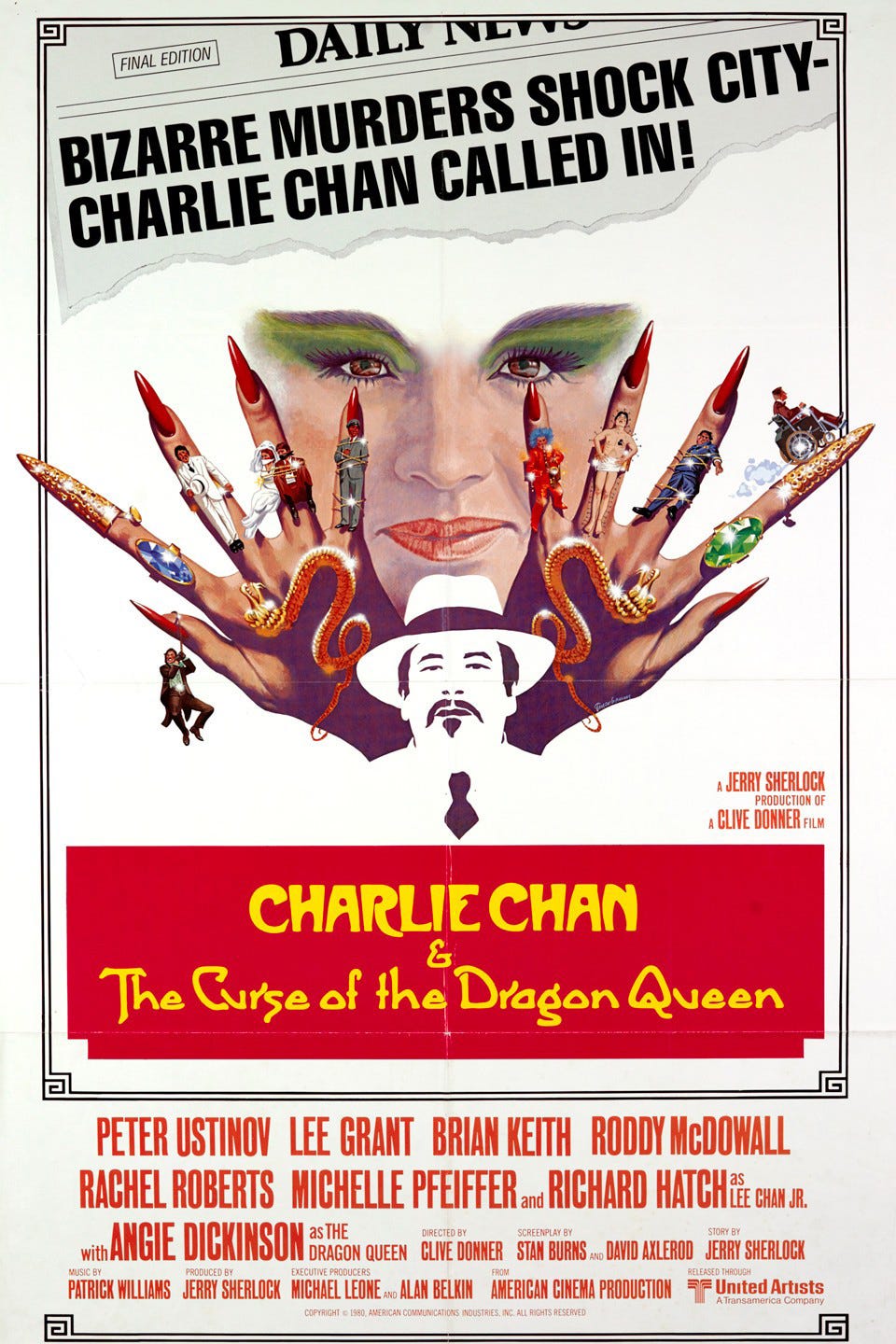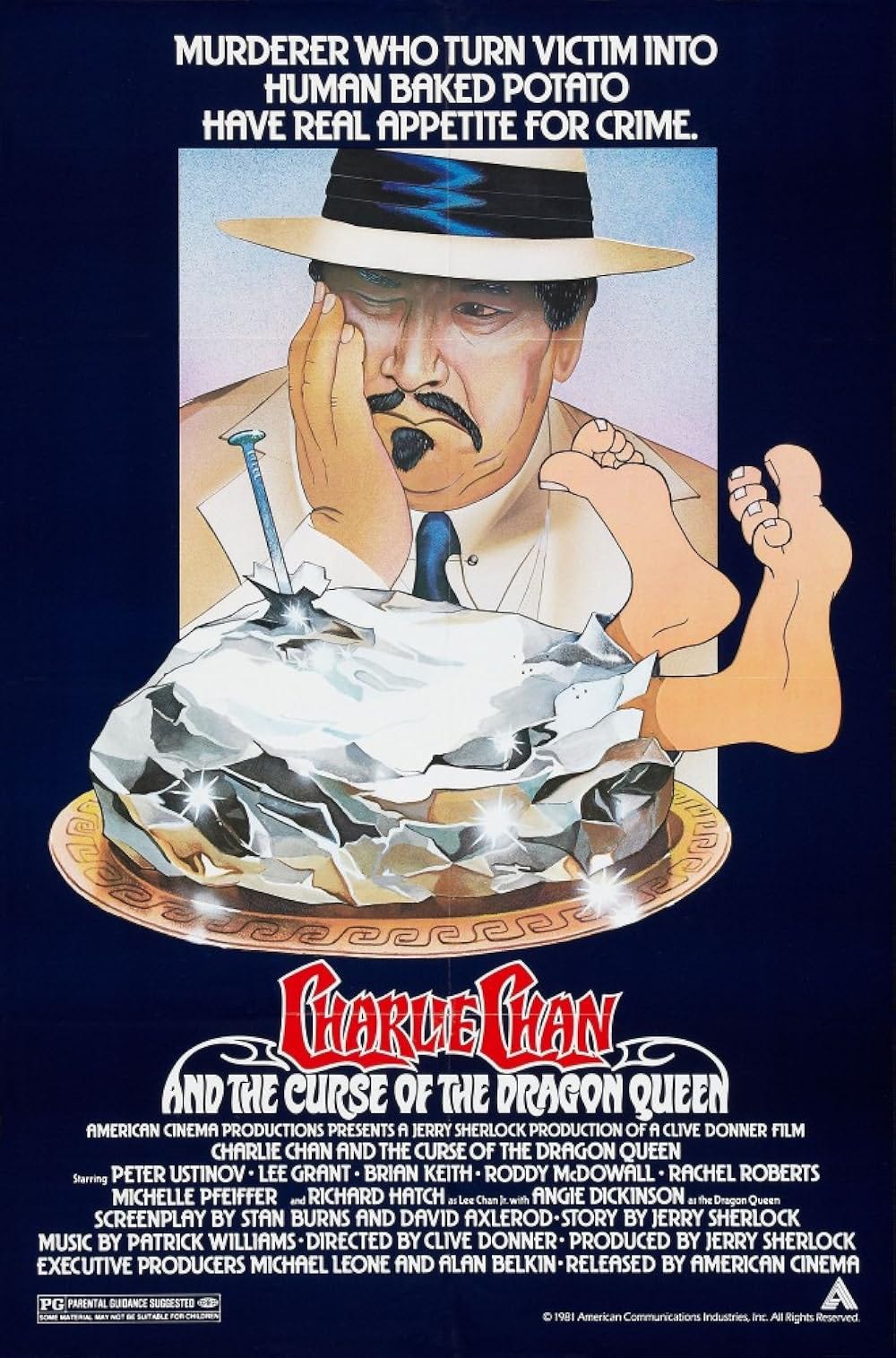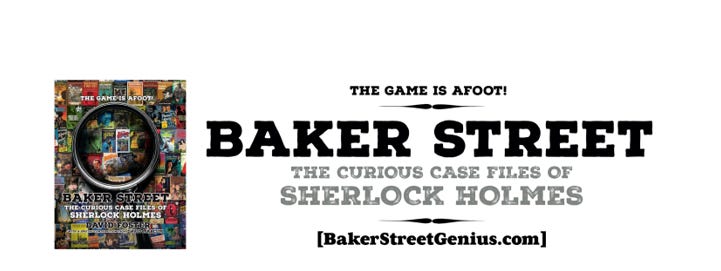In the early ’80s, Hollywood attempted to revive the Charlie Chan franchise with Charlie Chan and the Curse of the Dragon Queen. Featuring an all-star cast—including Peter Ustinov, Michelle Pfeiffer, and Angie Dickinson—the film blended slapstick comedy with classic mystery tropes. But did it capture the charm of the originals, or stumble under the weight of parody?
Beyond Baker Street XV
Curse of the Dragon Queen
Be careful what you wish for
G’day, everyone. I hope this newsletter finds you well. This will come as no surprise to anyone who has picked up a copy of my mammoth Sherlock Holmes compendium Baker Street, but I like mystery films. Beyond Holmes, I’ve enjoyed (and continue to enjoy) The Thin Man, The Saint, The Falcon, Philo Vance and many others. I’m also quite drawn to Agatha Christie tales—particularly those featuring Hercule Poirot. For many people of my generation (ahem), in the late 1970s and into the 1980s, Peter Ustinov was Poirot. Admittedly, his Poirot films are somewhat of a mixed bag. But I think the adaptation of Death on the Nile, in which he starred, is superior to the Suchet and Branagh versions.
Therefore, when I learned that Ustinov had starred in a film called Charlie Chan and the Curse of the Dragon Queen (1981), it quickly climbed to the top of my must-see list. Unfortunately, back then it was quite difficult to obtain. There were no streaming services, and importing a copy on DVD to Australia from the U.S. was cost prohibitive. But times have changed, and recently it popped up on Amazon Prime—and I just had to dive in.
I was fully aware that Charlie Chan and the Curse of the Dragon Queen had a bad reputation, but I figured “how bad could it be?” Therefore, I was not prepared for the trainwreck it is. I’ve always found the portrayal of Charlie Chan to be more than a little uncomfortable. The character himself—an early attempt at a positive Chinese detective—might have been well-intentioned at the start, but the execution quickly slid into cringe territory. Watching Sidney Toler or Warner Oland in full “yellow-face,” spouting stilted proverbs and bowing slightly every second line, is tough. It’s not just that they were white actors playing an Asian character—it’s that they did it in makeup, mannerisms, and mangled accents that reduced an entire culture to a collection of clichés.
And if that wasn’t awkward enough, somehow Ustinov managed to make it worse. His version of Charlie Chan felt like a parody of a parody. The whole thing collapses when Ustinov—clearly struggling to maintain the faux accent—lets it slip mid-sentence and you catch a whiff of his real, unmistakably British voice underneath. It’s like the mask falls off for a moment, and you realise just how hollow and contrived the whole thing really is.
Charlie Chan and the Curse of the Dragon Queen is one of those films that makes you wonder how it ever got the green light. Peter Ustinov plays Charlie Chan in full "this-seemed-like-a-good-idea-at-the-time" mode, trying to crack the case of a series of murders that may—or may not—be the work of his old nemesis, the mysterious Dragon Queen. Angie Dickinson plays the Dragon Queen of the title, but she’s completely wasted here—the character is so thinly drawn she practically vanishes into the set. You get the feeling Dickinson could’ve phoned it in, but even then, there’s barely anything to work with.
Richard Hatch—still riding the fumes of his Battlestar Galactica fame as Apollo—takes on the role of Chan’s bumbling grandson, Lee Chan Jr., meant to carry on the sleuthing legacy, though he spends most of the film in a kind of wide-eyed confusion. And there’s a young Michelle Pfeiffer, playing Cordelia Farenington, a love interest caught in the middle of the chaos. Honestly, I suspect she’s long since tried to blot this one off her résumé—and who could blame her?
The whole film feels like it’s straining to recreate the magic of the Pink Panther series—those early Peter Sellers classics where Clouseau’s clumsy antics somehow worked. But by the time Dragon Queen came out in 1981, even The Pink Panther films were wearing thin. Revenge of the Pink Panther (1978) felt tired and forced, and Trail of the Pink Panther (1982) was cobbled together from outtakes and leftover scraps after Sellers died. If you’re tempted to watch Charlie Chan and the Curse of the Dragon Queen, consider this your warning: it’s not a mystery, it’s a cautionary tale. Viewer discretion (and perhaps a stiff drink) advised.
Beyond Baker Street
I’ve always been fascinated by the shadow cast by Sherlock Holmes—a figure so iconic that his influence seeps into unexpected corners of pop culture. Beyond Baker Street is where I chase those echoes. Whether it’s a villain who once faced Holmes or a story that feels like it should’ve, this series lets me explore the strange tributaries that flow from the great detective’s world.
If you’ve enjoyed this piece, you’ll find even more to explore in my book Baker Street: The Curious Case Files of Sherlock Holmes—a deep dive into 100+ years of Sherlock Holmes in print, film, television, and beyond. From Conan Doyle’s original stories to pastiches, parodies, and pop culture echoes, it’s a must-read for Holmes fans and curious minds alike.
Yours in the Spirit of Adventure
David Foster is an Australian best-selling author who writes under the pen names James Hopwood, A.W. Hart, and Jack Tunney. Under the latter, he has contributed three titles to the popular Fight Card series. His short fiction has been published in over 50 publications worldwide, including by Clan Destine Press, Wolfpack Publishing, and Pro Se Productions, to name but a few. In 2015, he contributed to the multi-award-winning anthology Legends of New Pulp Fiction, published by Airship 27 Publishing.
Foster’s non-fiction work appeared in the award-winning Crime Factory Magazine, as well as contributing numerous articles exploring pulp fiction in popular culture to Girl Gangs, Biker Boys, and Real Cool Cats: Pulp Fiction and Youth Culture, 1950 to 1980 (2017, PM Press) and Sticking It to The Man: Revolution and Counterculture in Pulp and Popular Fiction, 1950 to 1980 (2019, PM Press). He has also contributed articles on the ANZAC war experience to Remembrance (2024, Union Street 21).
Foster lives in the old Pentridge Prison Complex, behind high grey stone walls, in inner-suburban Melbourne, Australia.
Get your copy today - Baker Street






